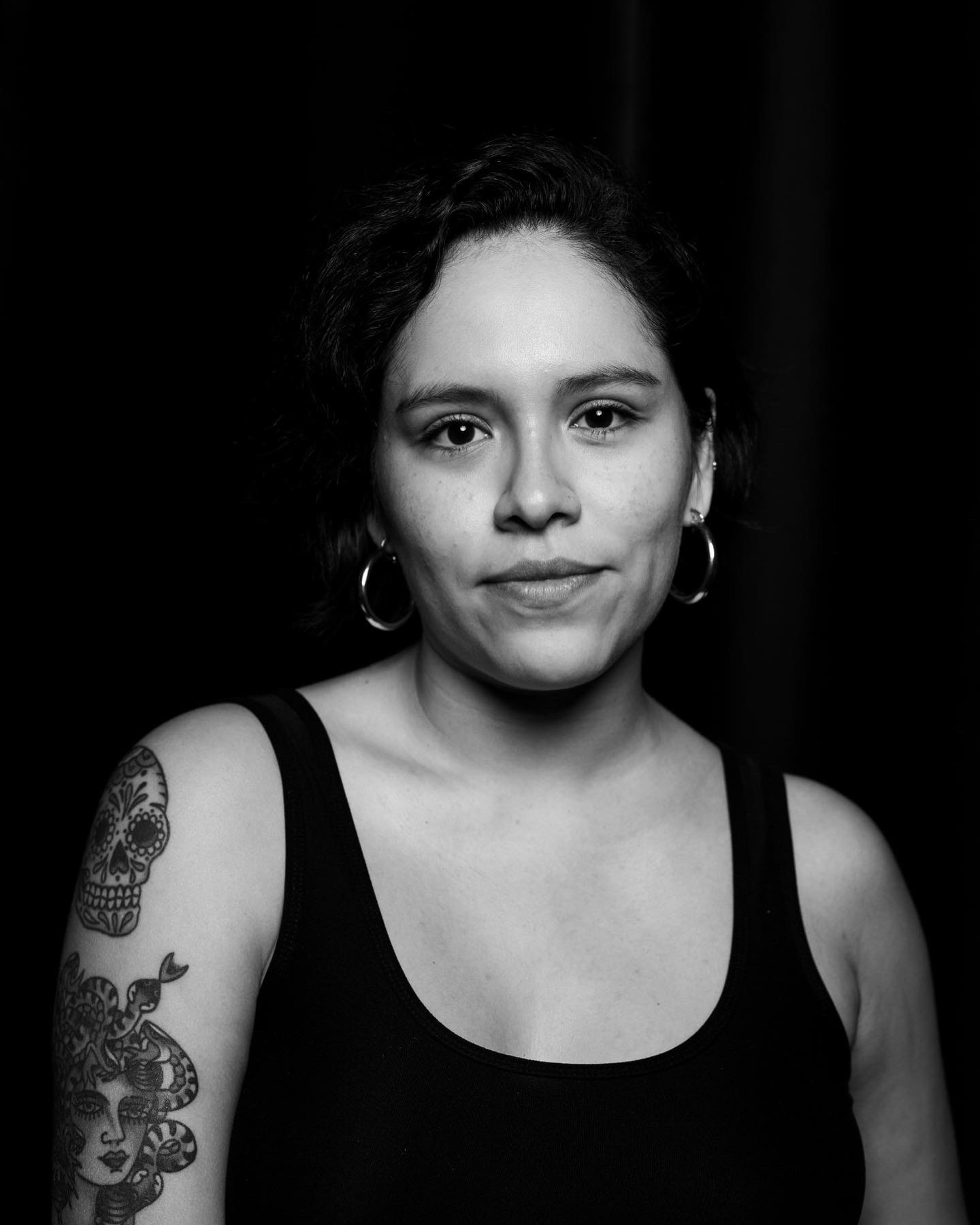I’m back after taking a week off to get married! 🤵🏻♂️👰♀️ Here’s what’s on the docket today:
How I Think About Story Structure, Part 2: Try
Adriana Tapia loves "Limbo" by Latino USA
What’s up in my world
Jobs at YR Media, the Smithsonian, the Seattle Kraken, and more
Descript acquires Squadcast(!) and more industry news from the past two weeks
Let’s do it.
This week, I’m continuing my series on want, try, get — what I teach my students to help them craft story structure in the simplest way possible. If you haven’t read my article last week, please start there, otherwise you might be a bit confused.
Try
As I went over last week, in Call in Colonel Mustard for Questioning, Jim Bodman wants to figure out why his hot dogs aren’t red. But Jim just wanting to change the color of his hot dogs isn’t a story. It’s just a slightly interesting fact about some dude named Jim who runs a hot dog factory. The thing that really makes it a story is him going on a journey to solve his want.
This is try comes in. And it’s an easy one to figure out. If Jim wants to figure out why his hot dogs aren’t red, he’ll have to try… to figure out why his hot dogs aren’t red. It’s beyond simple, but it’s key to understanding how you’re going to put your story together. We now have our source of truth for our journey. It’s Jim’s investigative journey to solve this baffling hot dog mystery.
Anecdote
To Ira Glass, this journey is called an “anecdote.” In the above video on the building blocks of storytelling, Ira explains:
Anecdote is literally just a sequence of actions. You can think of it as, “What is a story in its purest form?” A story in its purest form is somebody saying, “This happened, and that led to this next thing, and that led to this next thing, one thing following another….
In narrative podcasting, we often call these actions in that sequence of actions “story beats,” or just “beats.” So another way to describe an anecdote is a sequence of story beats. These beats are usually told in a chronological order, with one action leading to the next.
I always try to keep my beats as simple as possible. I’ll give you an example. Here’s how I’d “beat out” the hot dog story, as efficiently as possible:
The hot dogs are red and everything is great.
The factory moves.
The hot dogs aren’t red anymore.
Jim wants to know why the hot dogs aren’t red.
They search for a year and a half.
Nothing checks out.
They’re drinking one night and telling stories about this dude named Irving.
A light bulb goes off. It was Irving’s trip!
They create Irving’s corner.
These are the essential beats of the story. They all lead into each other. And they make sense as a sequence. We have the skeleton of our anecdote. There’s no writing, no sound design, no actualities, none of the stuff that makes a story feel like a story. But it’s our start. In fact, this is a pretty solid outline!
But/therefore
So we have our essential beats. The next step I like to take is to run our story through a “but/therefore” exercise. Megan Tan made me aware of this trick, and it always helps me make my stories better.
The exercise is explained in the above video by Matt Stone and Trey Parker, the co-creators of South Park:
We can take these beats, which are basically the beats of your outline, and if the words “and then” belong between those beats, you’re fucked, basically. You’ve got something pretty boring. What should happen between every beat that you’ve written down is either the word therefore” or “but.” So what I’m saying is, is that you come up with an idea and it’s like, “OK, this happens, and then this happens. No, no, no. It should be this happens, and therefore: this happens. But: this happens, therefore: this happens.
To Stone and Parker, things must happen for a reason. They argue that there are two factors that move our story along: 1. causation (therefores), and 2. surmounting obstacles (buts). Here’s how they work:
Therefore: Each event causes the next one. This is how we build our sequence. For example: I feel hunger, therefore I go to the refrigerator for a snack, therefore I find an apple, therefore I take the apple out of the fridge. Every beat flows into the next.
But: Our sequence is obstructed by an obstacle. It adds tension to our sequence. I take the apple out of the fridge, but it’s rotten. What do I do? I have to make a choice. Therefore, I compost the apple.
Let’s integrate this into our Colonel Mustard outline above:
The hot dogs are red and everything is great.1
But: The factory moves.
Therefore: The hot dogs aren’t red anymore.
Therefore: Jim wants to know why the hot dogs aren’t red.
Therefore: They search for a year and a half.
But: Nothing checks out.
And then2: They’re drinking one night and telling stories about this dude named Irving.
Therefore: A light bulb goes off. It was Irving’s trip!
Therefore: They create Irving’s corner.
Our sequence now has causation and obstacles. It’s more interesting!
Ira already released this story, so for us here, this is mostly an exercise in distinguishing what’s a cause and what’s an obstacle. When you’re putting stories together from scratch, I’d recommend using the but/therefore technique to help you construct your string of events in a logical way, where each one leads to the next compellingly.
Try doing this yourself. Write down the anecdote of what you had for breakfast today, using but/therefore. Start off with one of two options:
I wanted to eat, therefore…
I wanted to eat, but…
Go from there. What’s the most compelling anecdote you can tell that relates to your true story here? Feel free to send it to me and I’ll give you feedback :)
Next issue, we’ll finish the third part of want/try/get!
Adriana Tapia loves "Limbo" by Latino USA
Every week, I ask an outstanding podcaster to recommend one great piece that penetrated their hearts, and that they’d like to share with the world. Today, we’re featuring Adriana Tapia. Here’s Adriana’s interview and recommendation. (This interview has been lightly copy edited.)
Who are you and what do you do?
I’m Adriana Tapia, bilingual freelance producer. I’ve made work for VICE News Reports, Throughline, All Things Considered, Latino USA, and more.
What audio piece would you like to share with us?
“Limbo" by Latino USA (Website | Apple Podcasts | Spotify)It won the Premios Ondas last year! Yay!
Why do you feel compelled to share this piece?
I love this piece for several reasons, but the big one is that it portrays the immigrant experience with a nuance that I rarely hear or read. A lot of immigration coverage focuses only on the suffering of our journeys and excludes other equally important aspects: Our mental health. Love. Belonging. “Limbo” is a force in bilingual, intimate storytelling, spanning Miguel’s story across two decades and two countries. (Spain and the U.S.)
What's your favorite moment in the piece and why?
Around the 30 minute mark, we hear Miguel and his partner, Maria, talking about how they met. The writing around it and the tape selects in Spanish are vivid, seamless, and very sweet.
How has this piece inspired you/your work?
This piece is a testament to patience. Full disclosure: I know Miguel, and I know this piece took a long time to build. It reminds me that there are certain stories that you just have to let simmer for a while. Also, it affirms my belief that the future of audio storytelling is multilingual.
Shameless self-promotion time! Where can our readers follow you/find you?
You can follow me on twitter or reach out to me at adrianatapia18 AT gmail DOT com. (Yes, I made this address in the 2010s). I’m open for work right now!
Anything else you’d like to say?
Thank god it’s summer! An excellent time to listen to classic salsa gems, like this one.
What’s up in my world
A running reminder that I keep a list of podcast jobs on my website, which I update daily.
I’m behind in adding terms to the Podcast Glossary. I’ll pick it up again next week.
New jobs and opportunities
I keep a running list of jobs on my website, which I update daily.
🥇 Journalism and Podcasting Instructor, YR Media
A dream job for an audio instructor living in Chicago. YR Media is a gem.
🥈 Podcast Producer, The Smithsonian
You get to work with Smithsonian experts to produce a six-part series about African American music and entertainment. The former music journalist in me is already jealous of you.
🥉 Seattle Kraken Radio Broadcast Analyst, iHeart Media
Get this gig and you might just get to see Messi play IRL. Greatness awaits, friends.
➕ 25 more gigs that piqued my interest:
Production
Reporting
Arts Collaborative Reporter, KERA and The Dallas Morning News
Senior Reporter, Justice, Incarceration and Gun Violence, Gulf States Newsroom
Management and Editorial
Growth, Sales, and Business
Digital Media Planning Associate, National Public Media, NPR
Vice President, Analytics & Financial Planning (Audio/Podcast), Paramount Podcast and CBS News Radio
Internships
Links
Platforms and Tech
Wow. Descript acquires SquadCast. All Descript subscribers can now remotely record for free.
Steve Goldstein argues that podcasters should embrace YouTube for real growth, and gives some advice on how to start.
Triton Digital launches a Canada podcaster ranker.
Industry Health
According to AdWeek, Mattress Firm’s branded podcast with iHeart “drove four times return on ad spend and a 45% lift in incremental sales, meaning customers who were exposed to the campaign spent 45% more than customers that were not.”
Westwood One says that podcast ad spending from ad agencies and marketers is at a nine-year high.
Since 2014, podcasting’s share of ear in Edison’s share of ear studies has grown immensely, from a 1.4% to 10%.
Futuro is the latest company to lay off staff.
Content and Curation
Muzhinga Kankinda on how podcasts have helped the growth of African investigative journalism.
The Guardian highlights the “poodunit” podcast, Who Shat on the Floor at My Wedding?
Frozen lets the storm rage on with a new podcast.
Work culture
A guide for dealing with your manager based on their personality type, and what to do if your co-worker is sabotaging you.
Just to confirm: AI in the workplace is most definitely a thing, and business leaders are freaking out about it.
Click the footnote at the end of this sentence for the places where I tend to source my content. They’re great follows.3
I haven’t really discussed this yet, but this is the concept of a character being in a zone of comfort.
Notice how there’s actually an and then in there. It’s not a therefore because the beat “nothing checks out” didn’t cause them to drink. (Although in an alternate universe where we’re not bound to journalistic integrity, the story could go: nothing checks out therefore they become distraught therefore they binge drink and tell old stories.) It’s not a but because their drinking wasn’t an obstacle to nothing checking out. It’s an and then. Something just kind of magically happens when they’re drinking. A light bulb goes off. It comes out of nowhere, without a real cause. The upshot: and then’s don’t necessarily mean that you’re fucked. Just be judicious about telling stories where there are too many of them.
I source from CJR, Digiday, The Download, The Fiction Podcast Weekly, Google News, HBR, Hot Pod, Inside Radio, James Cridland, Neiman Lab, Podcast Business Journal, The Podcast Host, PodMov Daily, podnews, Soundbite, Sounds Profitable, and WorkLife.






Thanks for covering the Descript / SquadCast news :)